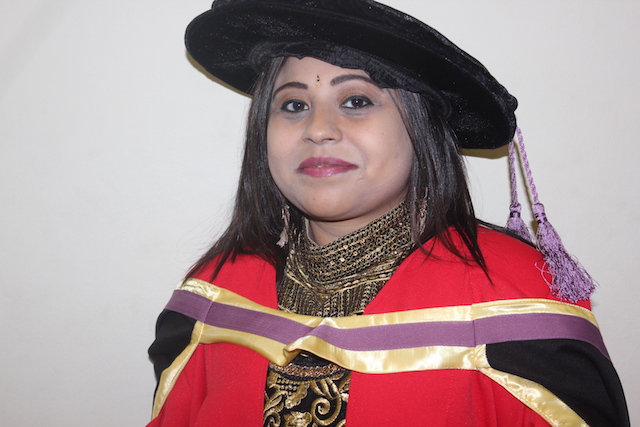“With the rapid increase in infections in sub-Saharan Africa and the high cost and limited access to synthetically derived drugs, we desperately need drugs that are easily available, and costs associated with treatments that are minimal,” stressed DUT PhD graduand, Dr Alveera Singh.
Dr Singh has dedicated four years towards research-work into the major health problem of TB which, according to the World Health Organisation (WHO), puts places South Africa as the third highest country in the world in terms of the TB burden, after India and China.
The passionate Dr Singh will now reap the benefits of her hard work after receiving her Degree of Doctor of Philosophy in Biotechnology at the Fred Crookes Sports Centre, DUT Steve Biko Campus today (Thursday, 1 September 2016).
“It felt surreal when someone calls me Dr Singh,” she said cheerfully. “I’m grateful and ecstatic that I achieved this at such an early age,” she bea
For Dr Singh, embarking in the field of Biotechnology was always on the cards with chemistry and biology being her favourite subjects.
The talented young scientist, under the helm and supervision of DUT’s Prof Bharthi Odhav and co-supervision of Prof Yacoob Coovadia, added that her research was necessary towards discovering cheap, new and effective antimycobacterial drugs.
“TB is a major health problem in South Africa. The emergence of multi-drug resistant (MDR) and extensively-drug resistant (XDR) strains of MTB has further complicated the problem of TB control. It is now become imperative that novel antimycobacterial compounds are discovered in order to treat infections and reduce the duration of current TB therapy courses,” she stressed.
Dr Singh further added that for centuries, medicinal plants have been used globally worldwide for the treatment and prevention of various ailments which occurred particularly in developing countries where infectious diseases are prevalent and modern health facilities and services were inadequate.
“In recent years, the use and search for plant drug derivatives have been fast-tracked. Ethnopharmacologists, botanists, microbiologists, and natural product chemists are trying to discover phytochemicals which could be developed for the treatment of infectious diseases, especially TB. Plants are rich in a wide variety of secondary metabolites, such as tannins, terpenoids, alkaloids, and flavonoids, which have been found in vitro to have antimycobacterial activity,” she said.
Her research on Bioactive compounds from South African Plants against Mycobacterium tuberculosis, studied nine medicinal plants which were tested for their ability to kill different strains of Mycobacterium tuberculosis (MTB) including the drug resist strains.
“Nine medicinal plant species, Buddleja saligna, Capparis tomentosa, Carpobrotus dimidiatus, Dichrostachys cinerea, Ekerbergia capensis, Ficus Sur, Gunnera perpensa, Leonotis leonurus and Tetradenia riparia were collected in KwaZulu-Natal following report of their therapeutic use in traditional medicine to treat symptoms and infections related to TB. The present study has scientifically validated the traditional use of medicinal plant B. saligna,” said Dr Singh excitedly.
Currently employed at a KZN research institute, Dr Singh hopes to continue her research in TB and HIV by pursuing a post-doctoral research fellowship. “I feel my PhD project can open up new lines of inquiry for TB research and I am currently using it as the foundation for a fruitful research career. I want to become a leader in the field of scientific research and assist in the training of new staff and students within a research group,” she said.
Dr Singh’s advice to students who are keen to follow in her footsteps is to persevere no matter the odds. “Success is the sum of small efforts, repeated day in and day out. Never give up,” she said.
– Waheeda Peters
Pictured: Dr Alveera Singh, DUT PhD graduand.


